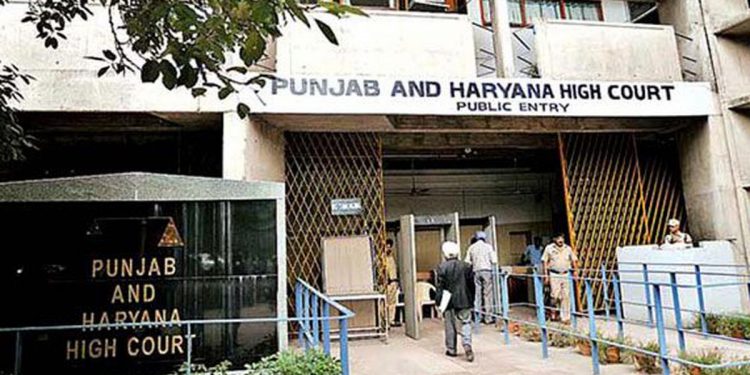The Punjab and Haryana High Court has dismissed the divorce plea of a couple that got separated on third day after their marriage. The plea was filed seeking waiver for six months period.
The high court, however, dismissed the petition and held that “timeframe a safeguard against hurried decision”.
Case:
The marriage of the parties was solemnised on September 10, 2020. They have been separated since September 13, 2020. The marriage has not been consummated.
Citing irreconcilable differences, a petition under Section 13-B of the Hindu Marriage Act, 1955 (to be referred as the Act), has been filed for dissolution of the marriage by the petitioner (man), contending that neither party has any claim against the other and no maintenance or permanent alimony has been demanded. Many efforts were made at mediation but the same could not yield any fruitful results.
Trial Court
As per the order, first motion was recorded on September 30, 2021, and on October 12, 2021, an application was filed for waiving the six months statutory period prescribed by Section 13B(2) of the Act, however, the application has been dismissed by the trial court by relying upon the judgment of the Supreme Court, as one of the four conditions laid down in the said judgment was not fulfilled which is statutory period of six months specified in Section 13B(2) in addition to the statutory period of one year specified in Section 13B(1) was not over before the first motion.
Arguments by both Parties
While arguing that the trial court was in error in rejecting the application, the counsel for the parties submitted,
The period of six months stipulated by Section 13B(2) is only directory in nature, thus, the same can be waived. It was further contended that the present case is one where exceptional circumstances exist for exercise of the power of waiver of six months period.
Both parties are mature being 31 years and 30 years of age respectively, are well educated and have a good standing in society. The husband is an IPS officer whereas the wife is IFS officer. Adequate thought has gone into the consequences of a mutual divorce.
Punjab & Haryana High Court
The Bench of Justice Sudhir Mittal, heard the matter and as reported The Indian Express, said,
The judgment in Amardeep Singh (supra) is unambiguous. It lays down that the object of Section 13-B of the Act is to enable parties to dissolve a marriage by consent if it has broken down irretrievably. This would enable them to explore other options and to move on in life. A period of six months has been provided in Section 13B (2) of the Act to safeguard against a hurried decision.
However, if a court comes to the conclusion that there is no chance of a reunion, it should not be powerless to waive the statutory period of six months so that the parties may not be subjected to further agony. Thus, it has been held that six months statutory period prescribed is directory in nature.
The Bench after perusing the conditions of the Act, held that, it shows that all of them are fulfilled except the condition of a period of 1 ½ years having elapsed before the first motion. Thus, the family court had no option but to dismiss the application filed for waiving the period of six months. In this view of the matter no error has been committed by it warranting any interference by this court.
MDO Take:
- There are two aspects to the cooling off period here
- Somewhere, we do agree with the courts that marriage must not be treated like a child’s play; When couples are not ready to give time to the relationship and its challenges even for 6-months, it speaks volumes of the sanctity of signing a legal bond today
- However, can any couple be compelled to stay in a relationship he/she does not wish to? Even if one of the spouses change his/her mind, and the other is still not willing to continue, why should we allow a dead relationship to consume years and decades of the court?
- Surely, marriage is a gamble and one only realises the reality, when they start cohabiting together under the same roof
- Fortunately, in the above case, there is no demand for maintenance/alimony, but what if circumstances change within 6-months, and the estranged wife is guided by her lawyer to demand so?
- Time and again we have said, Indian law must stop looking at marriage as a dead end for anyone’s life
- If all efforts of mediation have failed, couples must be allowed a smooth exit without legal barriers and hassles, unlike following the rule book strictly in the above case
- As a result, the estranged couple is in court, for a 3-day marriage and 1.3 years of separation
ALSO READ –
Bombay High Court Waives Off Divorce Cooling Period As Wife Is Pregnant With Another Man’s Child
Planning To Get Married? Educate Yourself With Types & Grounds For Divorce Laws In India
READ ORDER | Wife Staying Abroad With Child For Career Since 11-Years Is Not Cruelty Or Desertion Of Spouse
Family Court Grants Divorce By Mutual Consent Within Just Eight Days
ALSO WATCH –
Sudha Murty | Tips For Successful Relationship With Husband
Join our Facebook Group or follow us on social media by clicking on the icons below
Join our Facebook Group or follow us on social media by clicking on the icons below
If you find value in our work, you may choose to donate to Voice For Men Foundation via Milaap OR via UPI: voiceformenindia@hdfcbank (80G tax exemption applicable)































